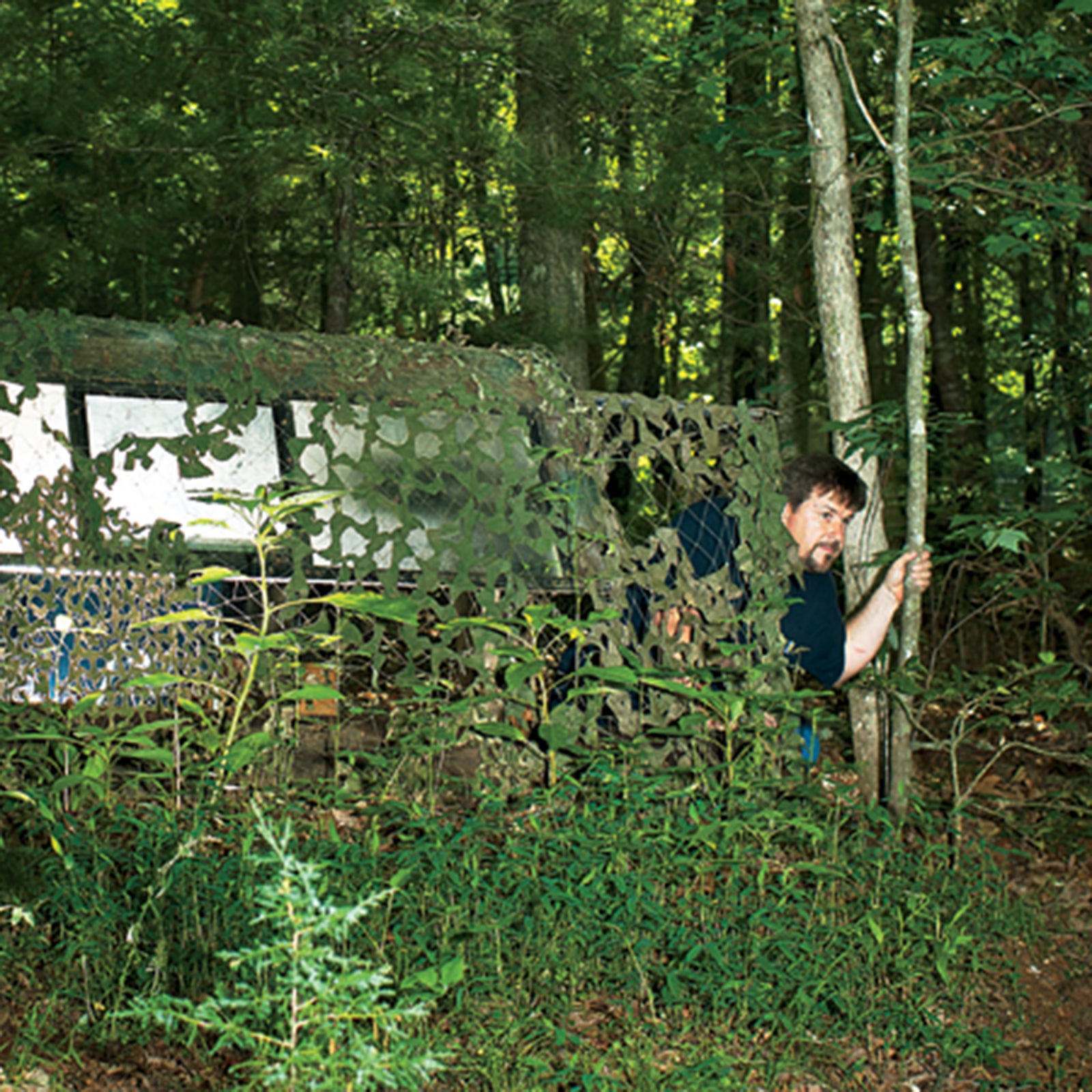Being prepared��is just the sensible thing to do, Scott Hunt tells me. Power outage? Superstorm? Nuclear attack? He’ll be ready. That’s why he has a pickup truck that runs on wood.
Spare generators
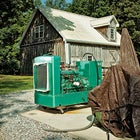 Spare generators
Spare generatorsHunt on ATV with Son
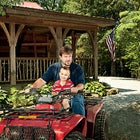 Hunt, with son Elijah, believes economic collapse could lead to anarchy
Hunt, with son Elijah, believes economic collapse could lead to anarchyFood-storage containers
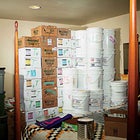 Food-storage containers
Food-storage containersEssential tools
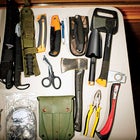 Essential tools
Essential tools��
We’re standing by a toolshed in the backyard of Hunt’s home near Pickens, South Carolina, staring at a tall metal contraption that sits in the rusting bed of a Ford F-100. It’s a generator that can turn wood chips into wood gas, which, in turn, can run an internal combustion engine.
“I look at a tree, I see a battery,” Hunt says amiably, grabbing his yellow Bernzomatic Fat Boy torch and firing up the “gassifier.” He fans the flame with a gush of compressed air and the truck rumbles to life. “It’s my Mad Max ��������ܱ�.”
The 46-year-old Hunt, whose blue polo shirt and neat goatee say soccer dad more than road warrior, believes in backups. He’s got his water supply: a 1,600-gallon spring- and well-fed tank on a hill overlooking his property. He’s got power and heat: an enormous wood-fueled generator, a diesel generator, a propane generator, an old Army immersion heater, solar panels, a wood-burning stove, and solar ovens. There’s food: five rotating vegetable gardens backed by a basement full of canned salmon and refried beans, white and red wheat kernels, potatoes, and dried milk. To turn the wheat into flour, he’s rigged up an old Healthmaster 750 exercycle with a belt and grinding wheel. “In a grid-down situation,” Hunt says, “I believe you need to be prepared to live like in the 1800s.”
To that end, he takes home security very seriously. In his office, there’s a shoulder-high gun safe and piles of rifle cartridges. There are camouflaged lookout posts hidden in the woods beyond his house, infrared sensors planted around the perimeter of the property, and a concealed Smith and Wesson .38 that Hunt carries at all times.
Even to the grocery store? I ask.
“We’re living in a time of instability,” he says, wiping his hands on his jeans. “It doesn’t take long for people to turn into animals.”
Hunt isn’t alone in all of this. By phone I connect with a man I’ll identify only as David, a Houston resident whose house looks like all the other stucco McMansions in his gated community. But as David will tell you, the pantry is overstocked with food, there’s an unusually large amount of medical supplies in the hall closet, and he has two gun safes. Inside his office closet are four stuffed backpacks and a pair of oversize military duffel bags loaded with water filters, food, first-aid equipment, and duct tape. There are also four military load-bearing vests, the kind Army troops wear in Afghanistan: one for David and one each for his wife and two teenagers. �����ԹϺ��� his front windows, the flower beds are raised 16 inches off the ground, higher than you’d see in normal gardens. This serves a particular purpose, David says.
“They’d make really good bullet stops,” he says calmly, as if he’s describing prize rosebushes. “Most people think a gunfight happens at waist level or higher. But really, if there’s going to be a gunfight, it happens about 12 inches off the ground.”
David assures me that his bulletproof planters are hardly extreme. “There are sites online where you can buy a chart to learn to field-dress a human body,” he says ominously. Not that he approves.
Scott and David are both preppers, members of a growing subculture of Americans who spend time and money—lots of it—preparing for apocalyptic scenarios of various stripes. They don’t like being called survivalists—that word has dark, kooky connotations—but it’s often hard to see much difference between them and other types of doomsayers who’ve cropped up in recent decades, motivated by everything from fear of nuclear war to antigovernment paranoia to Y2K. Whatever the label, the common thread is that things are going to hell and you can and should take measures to defend yourself. After all, the ants should be ready when the starving grasshoppers start running through the woods.
Today’s preppers worry about a variety of possible disasters: an economic collapse resulting in food shortages and anarchy (“It would only take nine days of hunger for the women to begin prostituting themselves,” Hunt tells me); grid-ruining electromagnetic pulses (EMPs) caused by solar activity or nuclear blasts; oil shortages; or natural disasters like Katrina or a seismic Big One.
Though preppers, unsurprisingly, lean heavily toward don’t-tread-on-me-style Tea Party libertarianism, the movement spans the political spectrum to include climate-change-fearing liberals and Portland bike messengers who raise bees on the roof as an act of anticorporate self-sufficiency. The majority of preppers, however, are Christian conservatives who don’t especially care for Obama’s “socialism” and are influenced at least in part by end-time theology. “Followers of Christ know there will be difficult times before he returns,” Hunt tells me at one point, though he insists he’s preparing for more secular calamities. The chain of events he considers most likely is an economic collapse leading to food shortages and eventual anarchy, though EMPs run a close second. He’s got an app on his Droid to warn him of oncoming solar flares.
Like 12-steppers or model-train enthusiasts, preppers have their own lingo: TSHTF (the shit hits the fan) and TEOTWAWKI (the end of the world as we know it) are popular, as are WROL (without rule of law), BOB (a bug-out bag, the backpack full of supplies you keep in case TSHTF and you have to GOOD—get out of Dodge). They maintain blogs like , with tutorials on long-term food storage and building hidden safety rooms. They have their own idiosyncratic preoccupations: the current price of gold, insurance stability indexes, the likelihood of volcanic eruptions in Yellowstone.
As you might expect, many preppers prefer to fly under the radar. It’s tricky explaining to uninitiated strangers why EMPs are a serious threat without provoking wisecracks about tinfoil hats. And if TSHTF, you don’t want those strangers knocking on your door looking to “redistribute” your canned beans.
“I look at a tree, I see a battery,” Hunt says amiably, grabbing his yellow Bernzomatic Fat Boy torch and firing up the “gassifier.”
Without fail, Preppers insist there’s nothing weird about what they’re doing. “Most of our members are typical middle-class people with average jobs,” says Washington State-based Tom Martin, director of the , an online forum for the movement. Though hard numbers are impossible to come by, Martin believes the prepper community has “exploded” in recent years. His website, started four years ago, now has nearly 19,000 members. The word prepper, unheard of just a few years ago, is now in use on thousands of prepper-specific blogs, websites, and YouTube videos. Preparedness conventions and self-reliance expos have sprung up in nearly every state. Cashing in on the trend, National Geographic Television launched a gawking reality show last year called Doomsday Preppers.
Why this? Why now? Mark Potok, an expert on fringe political movements who works for the Montgomery, Alabama-based Southern Poverty Law Center, says end-time groups, largely dormant since 1999’s Y2K freak-out, have “come roaring back” in the past three years.
“These things happen in times of great change, when there’s real social stress,” he says, citing the economy and the rapid societal upheavals wrought by globalization. “That’s what we’ve been going through.”
We’re certainly living in an anxious era. Recession. Global warming. Terrorism and the permanently rattled mood that began on September 11, 2001. Even the fringiest views get mainstream airplay these days, making the once crazy seem nearly normal. During his failed bid for the GOP presidential nomination, talked freely about his fear of EMPs produced by high-altitude nuclear bombs. “Without adequate preparation,” he said in a 2009 video address to a group concerned with the phenomena, “we would basically lose our civilization in a matter of seconds.” Prominent economists like Nouriel Roubini warn of further economic collapse radiating out from the European Union. “Greece is just the tip of the iceberg,” he said at the 2010 Milken Institute Global Conference in Los Angeles. Self-sufficiency is suddenly a buzzword, with everyone from Tea Partiers to Brooklyn hipsters lamenting the loss of our great-grandparents’ handiness. These fears are reflected in pop culture, with Hollywood cranking out apocalypse-themed fare like The Hunger Games and The Walking Dead as fast as it can.
This isn’t the first time the country has been gripped by doomsday anxieties, of course. Predictions about the end of the world have popped up regularly throughout U.S. history. Amid the growth, urbanization, and westward expansion of the 1800s, the apocalypse flame burned across America, spawning various end-times-themed religions, including Seventh Day Adventism and Mormonism. During the white-knuckle years of the Cold War, ordinary suburbanites went around digging backyard bunkers and stockpiling Spam. In the 1990s, the survivalist-oriented militia movement made headlines, while Y2K brought a surge in sales of guns and gear. Now we have preppers.
“You’re seeing more and more people obsessed with things like this,” says Jay Lemery, an assistant professor of emergency medicine at Weill Cornell Medical College, in New York City, and the president-elect of the . “It’s infiltrating all aspects of normal life. I walk into an REI and there’s a whole section for disaster preparedness. September 11 changed everything, then compound that with Katrina. The idea that we live in the United States and somebody’s going to save you….” He trails off. “That really shook people.”
“We have children like you,” a woman in a pink polo shirt named Debbie says to me. “They’re not prepared, either. We cry all the time, because we know that if there’s ever a grid-down situation and the roads are cut off, we might never see them again.”
I’m sitting on gym bleachers inside the Cherrydale Place Church in suburban Greenville, South Carolina, talking with a handful of middle-aged preppers. I’m here for the South Carolina Sensible Preppers conference, the second such gathering this year. Roughly 500 people are crowded inside the church, listening to lectures on food storage and home defense. Every few hours, there’s a raffle for items like rifle scopes, flashlights, and Glock holsters in a choice of colors: black or “dark earth.”
Unlike the wild-eyed Chicken Littles typically portrayed on Doomsday Preppers—including a New York City fireman who thinks a volcanic explosion will choke Manhattan with ash—the crowd milling around the gym would look at home at a South Carolina football game: Nikes, Old Navy tees, baby strollers. And yet, as ordinary as the attendees seem, there’s a distinct air of electricity in the church, a sense of shared chosenness.
Don Porter, a handsome South Carolina businessman who organized the conference, takes the stage. “With what is going on in our nation right now, if you’re not prepping, you’re not thinking,” he says. Applause breaks out, and Porter grins. “You are not alone.”
They’re also not crazy, they emphasize.
“Nothing I have is anything everybody shouldn’t have,” says Tiffanee, a thirtysomething African-American woman from North Carolina, who says she’s worried about ordinary weather-related disasters. She shows me the contents of the multipocket Maxpedition bag she carries at all times. Inside, there’s a first-aid kit, a flashlight, an escape tool for breaking car windows, and several packs of Gatorade powder. At home she has months’ worth of food and water, weather radios, and CBs. Plus weapons, though she doesn’t want to talk about that. Tiffanee has always been fascinated with survival skills, she says—she even worked in emergency management for a while—so attending prepper conferences is a natural step.
“She’s loved knives ever since she was a little girl!” her mother tells me. “We used to call her Bladey Mae.”
I listen to a talk on food storage, in which I learn that “sugar is one of the currencies of tomorrow.” I sit through a first-aid lecture and hear that feminine products are a good way to stanch gunshot wounds and that I should stockpile animal antibiotics from online pet-supply companies. “If a fish can take it, a human can take it!” a speaker says.
I talk to a retiree from West Palm Beach who tells me he started prepping after living through two hurricanes. “You would be surprised as to how society breaks down in very little time,” he says. I talk to a mohawked welder from Alabama who says God has called him to “build a sanctuary for my family,” but he’s been having problems with boll weevils in his flour stockpile. I listen to two men debate the merits of various assault weapons for defending one’s home against marauding neighbors.
“There are more people killed in the U.S. by a .22-caliber long rifle than any other gun,” says one. He means this as a good thing.
Vendors have set up tables in the hallways and Sunday-school classrooms outside the gymnasium. The owner of a North Carolina prepper supply store displays books: Where There Is No Doctor; Basic Butchering of Livestock and Game; Survivors: A Novel of the Coming Collapse. In the room next door, a friendly young Iraq vet sells night-vision goggles and Zombie Hunter bumper stickers.
Nearly all the vendors here started their operations in the past year or two, and all say that things are going gangbusters. “Business has been great,” says Chuck Ascher, a 23-year-old ex-Marine from Oregon who’s manning a table of water filters and “survival bracelets” woven from military parachute cord. “Stuff’s flying off the shelves.”
Scott Hunt knows all about the business side of prepping. An engineer by training, he worked for Michelin for years before settling into his current job: retrofitting homes for doom times. He and a partner travel the country engineering wells, installing solar generators, building chicken coops, and planting fruit orchards. Hunt launched in March 2011. By July he was so busy he was turning away clients.
His own spread is a testament to the fact that a fully prepped home need not be a bunker. A 4,500-square-foot structure built with local white pine, stylish cast-iron railings, and double-high ceilings, it’s right out of Better Homes and Gardens. Hunt lives here with his pharmacist wife, three teenage daughters, and five-year-old-son.
“They’re excited, they’re like kids,” Hunt says of his clients, chuckling over the happy preparedness of it all.
After showing me the wood-fueled truck, Hunt leads me through red-clay Carolina hills to visit one of his current projects, an in-the-works retreat belonging to a wealthy Connecticut couple new to prepping. The couple visited Hunt at his house last year, took a look around, and told him they wanted everything he had and then some. They’ve already spent $100,000 modifying the retreat—a beige 5,500-square-foot palace on a rural hillside—and Hunt figures they’ll spend another $100,000 before they’re through.
This kind of spending is not atypical in the prepper world. In an area described only as “the eastern side of the Rockies,” one developer has been selling underground prepper condos carved out of an abandoned missile-silo facility. Prices start at $2 million. If you can’t pony up a couple mil, a company called Vivos offers rental shares in a network of shelters with “the comfort of a luxury yacht,” starting at a mere $20,000 per person per year.
Hunt’s clients have no problem shelling out. One family in Virginia spent upwards of $250,000 on a retreat cabin—solar panels, security fencing, a clean-water system with five redundancies. Another client is building an entire EMP-proof community in Virginia, but Hunt’s not sure he’s supposed to talk about it. The founder, a businessman from Charlotte, North Carolina, helicoptered down just to meet him.
Then there’s this Connecticut couple who have ordered the works. Scott and I drive down the long, winding driveway to look at the rabbit hutches—rabbits offer the best feed-to-meat yield of any domesticated animal—and admire the new $15,000 Kubota tractor in the tool-and-implement barn, which is also new. I can smell the fresh-cut edges of the wood.
“They’re excited, they’re like kids,” Hunt says of his clients, chuckling over the happy preparedness of it all.
With people��spending $200,000 building a tricked-out retreat house complete with guaranteed hot showers and three years’ worth of freeze-dried pineapple chunks, you have to wonder: Won’t they be disappointed if the shit doesn’t hit the fan?
Hunt says nope, no way. “Hope and pray for the best, prepare for the worst,” he says. I believe him. But still.
If TSHTF, Hunt’s plan is this: His mother, his business partner, and his family will move in with him. If his daughters are away at college, they’ll of course have to come home. Hunt and his partner will spend their days being commandos, patrolling the perimeter and talking on radios. The way he describes it, the collapse sounds like a grown-up Boy Scout camp combined with Rambo.
Beyond the Boy Scout stuff, there is something primally appealing about the idea of life stripped to the bare essentials. If TSHTF, all the crap you have to deal with in your day-to-day 21st-century life—your ignorant boss, lines at the bank, the neighbor who asks you to please trim those tree branches because they’re hanging over into his yard—would be gone.
I asked J. Gordon Melton, a religious-studies scholar at Baylor University who has written about apocalyptic movements, why he thinks these tides of panic are so popular. Don’t people catch on to the fact that the world never ends as predicted? Melton is philosophical.
“There’s always a gap between what we want—what we expected to get out of life—and what we actually wind up with,” he says. “When that gap becomes so big that we don’t see any way of ever bridging it, that sets the stage for this idea of ‘Let’s just get rid of it all.’ ”
After the lecture about gunshot wounds at the Sensible Preppers conference, I wander into one of the Sunday-school classrooms and strike up a conversation with Billy Sterrett, the 28-year-old son of the owner of , a North Carolina-based prepper supply store with a table at the expo.
My phone buzzes, and I start shooting off a text message, then Billy’s phone buzzes and he starts doing the same. He grimaces.
“You know how crazy you get when you leave your cell phone at home?” he says. “I hate that. You know, if the power went out forever, I’d be happy.”


